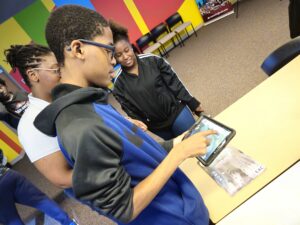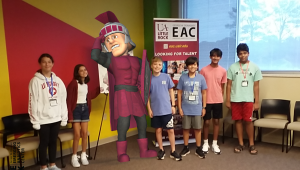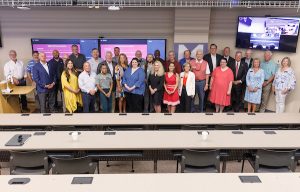
The original article was written by John Callahan. The original article can be found here: https://armoneyandpolitics.com/tech-20-spotlight-jan-springer/
Jan Springer is an associate professor of computer science and director of the George W. Donaghey Emerging Analytics Center at the University of Arkansas at Little Rock. His work is on virtual reality systems for modeling and simulation in areas such as cluster-based displays, multiviewer stereo, software framework and interactive, high-quality rendering. Originally from Germany, he studied computer science at Bauhaus University, Weimar, where he earned his Master of Science in 1999, specializing in real-time graphics, VR and related software engineering.
From 1999 to 2001, Springer was a research scientist at GMD IMK, Germany’s premier VR research group. He returned to his alma mater in 2001 as a research staff member to continue his work with VR, earning his Ph.D. in 2008. Springer then did a three-year postdoctoral stint at the University of Louisiana at Lafayette, where he worked as a senior research scientist in the CREATE group alongside one of the field’s great pioneers, Carolina Cruz-Neira. There, he helped in the creation of a prototype cave automatic virtual environment system that placed users on a 360-degree treadmill with a surround-screen display.
After several years as an assistant professor at the University of Hull in the United Kingdom, he joined UA Little Rock in 2018 as an associate professor and fellow of the Emerging Analytics Center, which was founded by Cruz-Neira during her time at the college. When Cruz-Neira left the university in 2019, Springer took up the role of interim director of the EAC in 2020 before being confirmed as permanent director a short while later.
“The Donaghey Emerging Analytics Center is a department within UA Little Rock with a focus on research and development in immersive visualization, augmented/virtual/mixed realities and interactive technologies in general,” Springer said. “The EAC is further including in its portfolio research in cybersecurity, mobile/ubiquitous computing and the internet of things, as well as applications of machine and deep learning. Additionally, the EAC is collaborating very closely with the department of computer science at UA Little Rock, where the computer science department is the prime talent pool for the EAC. In return, the EAC offers wide-ranging opportunities for students in professional software development, as well as academic and industry research.”
The center’s student team is a balanced mix of graduate and undergraduate students, who the center provides with valuable insights and experiences for their career development while working on real-world projects — an uncommon opportunity, especially for undergraduates. One example is Project 360, which allows anyone to tour points of interest on the UA Little Rock campus with 360 degrees of vision. CrimeScene 360 is built with the same technology in collaboration with the criminal justice department at UA Little Rock and with the support of the Little Rock Police Department. The program allows users to explore a crime scene and experience the intricacies of police work for educational or edutainment purposes. The EAC team is currently in the final stages of an initial collaboration with the university’s nursing department to extend their virtual patient care scenarios.
Another major area of focus for the center and the department of computer science as a whole is cybersecurity. To this end, the EAC uses the Trojan Cyber Arena, a fully cloud-based system of cybersecurity training infrastructure that can provide low-cost cybersecurity training for anyone. The project hosts UA Little Rock’s cybersecurity program in the department of computer science, as well as the National Cybersecurity Teaching Academy, and provides courses for high schools around the state.
Other projects deal with fields such as human-computer interaction; the study and creation of computer products that help users carry out tasks; machine and deep learning, which allows for the much more efficient use of data and the information within it; ubiquitous computing and the internet of things; incorporating computing, communication and “smart features” into everyday objects; and health informatics, which, like machine learning, help turn vast amounts of patient medical data into useful info. In addition to traditional academic grant funding, several of the EAC’s projects are connected to and funded by federal agencies or national corporations.






